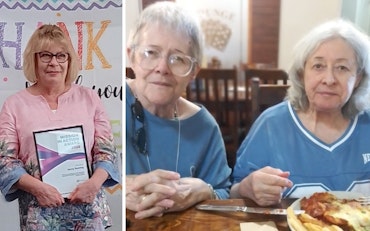Government establishes National Aged Care Advisory Council
A key recommendation from the Royal Commission into Aged Care Quality and Safety has just been established by the Federal Government, with 17 expert aged care representatives appointed to the inaugural National Aged Care Advisory Council.
![<p>The National Aged Care Advisory Council consists of 17 experts in the aged care field who can advise the Government on issues in the sector. [Source: Shutterstock]</p>](https://agedcareguide-assets.imgix.net/news/articles/news/articles/25_11_2021-NACAC.jpg?fm=pjpg&format=auto&w=550&q=65)
The National Aged Care Advisory Council consists of 17 experts in the aged care field who can advise the Government on issues in the sector. [Source: Shutterstock]
The chosen 17 Australians on the Council will provide the Government with expert advice on aged care issues and the implementation of the Government’s $17.7 billion aged care reform agenda.
The creation of the Advisory Council is already five months behind schedule according to the Government’s reform timeline, which aimed to establish the body on 1 July this year.
Andrea Coote, inaugural Chair of the Aged Care Quality and Safety Advisory Council, will be leading the National Aged Care Advisory Council and ensuring aged care reforms meet the needs of older Australians, their families and carers, and the Australian community.
Minister for Health and Aged Care, Greg Hunt, says the establishment of the Advisory Council is the biggest step to have been taken yet in the aged care reform agenda.
“This is the most significant reform ever undertaken by an Australian Government to improve the care of senior Australians both in residential care and care at home,” says Minister Hunt.
“This Advisory Council will play a key role in guiding that implementation, alongside a new Council of Elders and an Inspector-General of Aged Care.
“I welcome the appointment of all 17 members to the Advisory Council and I look forward to working alongside them as we ensure our aged care system delivers respect, care and dignity for our senior Australians.”
The Federal Government is also working on the Council of Elders body with nominations and membership still up for consideration. It is expected the representative body will be announced later this year.
Ian Yates, Chief Executive of Council on the Ageing (COTA) Australia, has already been announced as the inaugural Chair of the Council of Elders.
Alongside the Advisory Council will be three supporting working groups – the Workforce Advisory Working Group, the Quality Advisory Working Group and the Financing and Markets Advisory Work Group – that are yet to be established.
Minister for Senior Australians and Aged Care Services, Richard Colbeck, says the establishment of the Advisory Council is an important step forward.
“We know if you want things to change in the sector then the structure which supports it must also change,” says Minister Colbeck.
“Aged care in Australia is undergoing its most significant reform in a generation.
“Strength through representation is key to ensuring these changes are made in the best interests of senior Australians and those who care for them.
“Our intention is to ensure we have strong representation across five consumer groups including Indigenous, culturally and linguistically diverse, carers and advocacy groups.”
The Advisory Council will be able to provide a voice for home care, community and private aged care providers, along with a representative of peak group, Australian Aged Care Collaboration (AACC).
The AACC has welcomed the establishment of the Advisory Council, as it believes the Council will play an important role in guiding the Government to work with the sector when delivering its roadmap of aged care reforms.
“We welcome the diversity of the Council membership which, importantly, includes practitioners with direct experience of age services delivery,” says Sean Rooney, AACC representative.
“As a sector, we are deeply concerned with the progress of the reform process to date, including the lack of a detailed plan and limited genuine engagement with key stakeholders who have much to contribute to the design of our new aged care system.
“Although the establishment of the Council is five months later than the Government’s published plan, the sector has high expectations. We look forward to the appropriate involvement of sector representatives in the co-design and development of major reforms to aged care service delivery.
“We expect the Council to be responsible for the design of the reform program and accountable for its delivery, engaging all stakeholders in key decisions that affect them and transparently reporting progress to the community.
“We agree with the Royal Commission that the aged care system must put older people at the centre of everything it does. We look forward to working together with the Government to improve the quality and delivery of age services for the benefit of older Australians.
“The Royal Commission has called for transformational change to the aged care system and the new Aged Care Advisory Council will play a lead role in realising this outcome.”
Minister Colbeck has also thanked David Tune PSM, the Chair and member of the previous principal aged care advisory group, the Aged Care Sector Committee, which ceased in June this year.
He adds that the new Advisory Council is different from the previous representative model, as it includes practitioners with direct experience, knowledge and activity within the aged care sector.
The representatives on the Advisory Council include health and allied health experts across different fields, as well as IT systems, finance, and workforce professionals.
The National Aged Care Advisory Council Members are:
-
Advisory Council Chair: Andrew Coote (former Victorian Member of Parliament)
-
Council of Elders Chair: Ian Yates AM (Chief Executive of Council on the Ageing (COTA) Australia)
-
Rachel Argaman (Chief Executive Officer (CEO) of Opal Healthcare)
-
Michael Baird AO (CEO of HammondCare and former Premier of New South Wales)
-
Jennene Buckley (Founding Partner of Enkindle Consulting, Director of Aged Care IT Council, former Director of Aged & Community Services Australia (ACSA), and former Executive Director of Feros Care)
-
Liz Callaghan (CEO of Carers Australia and former CEO of Palliative Care Australia)
-
Andrew Condon (Company Director of RSL LifeCare)
-
Jill Gallagher AO (CEO of the Victorian Aboriginal Community Controlled Health Organisation)
-
Emma Hossack (CEO of the Medical Software Industry Association)
-
Dr Sandra Iuliano (aged care focussed Senior Research Officer at the University of Melbourne)
-
Claerwen Little (Chair of the AACC and National Director of UnitingCare Australia)
-
Libby Lyons (Chairperson of Aged Care Workforce Industry Council)
-
Maree Mccabe AM (CEO of Dementia Australia)
-
Gail Mulcair (CEO of Speech Pathology Australia)
-
Associate Professor Michael Murray (President of the Board of the National Ageing Research Institute)
-
Mary Patetsos (Chairperson of the Federation of Ethnic Communities’ Councils of Australia)
-
Graeme Prior (CEO of Hall & Prior and International Federation on Ageing)










